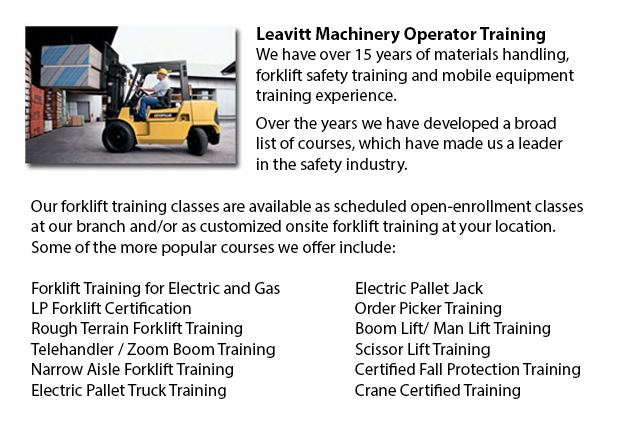
Forklift Training Classes Surrey - Forklifts are a kind of heavy lifting machine utilized to handle and move material safely and efficiently. Occasionally referred to as Lift Trucks, they are made use of in different industries. Staff working with and around lift trucks should be trained to spot dangers associated with the use of forklifts.
We provide training classes known as Safe Operation of a Forklift. The classes provide instruction in the theory part of becoming a forklift operator. Individual training will learn their legal responsibilities as lift truck operators. Upon completing the classes, a printed certificate will be issued. The certificate must be signed by an individual qualified to verify that a hands-on evaluation has been completed in the trainee's workplace.
Forklift Safety
Lift trucks are utilized extensively in industrial work environment because of their ability to lift and transport heavy loads. These industrial machinery are essential and indispensable for a lot of organizations, yet they could be dangerous if operated by employees who is not properly trained. Lift truck injuries, when they take place, tend to be serious because of the power of these heavy equipment. Workers who work frequently around forklifts could become complacent and forget the dangers. Vital operating and maintenance procedures may be neglected.
Lift truck training is needed for new staff, but all operators should undergo periodic re-training. First aid training is vital too.
The daily inspection is critically important in the day to day maintenance and operations of a lift truck. The forklift may become damage if not correctly maintained. Before being utilized, forklifts should be visually inspected as to their general condition. An operational inspection should be performed in order to determine the machinery is working right. The supervisor has to be alerted if anything is noted which can affect the safe utilization of the forklift.
An inspection determines if the place is clear of things which could pose a danger. Any overhead obstructions must be noted. Check that a working fire extinguisher is accessible. Different levels must be checked, like for example engine oil, fuel, radiator water, and electrolyte levels in cells. Plugs, batteries and cables should be inspected. Unclog vent caps and ensure that nuts, bolts, guards, chains, and hydraulic hose reels are not missing, loose or damaged. A tire check will ensure that wheels are not damaged or worn. Pneumatic tires will need a pressure inspection.
-
Crane Ticket Surrey
Crane Ticket Surrey - The modern type of a crane could be either complex or simple, and cranes vary based on their application. Mobile cranes, for instance are rather simple. A telescopic boom or steel truss mounts its movable platform. A system of l... More -
Overhead Crane Training Surrey
Overhead Crane Training Surrey - An overhead crane is a large crane made use of to lift and move big, heavy things which cannot be lifted manually. An overhead crane is usually fixed in position when in use. These equipment are capable of moving huge... More -
Manlift Operator Training Surrey
Manlift Operator Training Surrey - A specialized type of hydraulic platform is referred to as an aerial lift or a man lift. It is meant to hoist an individual vertically up and down and therefore, is likewise known as a vertical personnel lift. This... More -
Heavy Equipment Safety Training Surrey
Heavy Equipment Safety Training Surrey - A very essential topic for those who work in industry environments is heavy equipment safety. This particular subject is relevant for people likewise who employ the use of heavy machinery to be able to carry o... More -
Wheel and Track Loader Training in Surrey
Lift trucks are obtainable in a variety of different units which have various load capacities. Nearly all average forklifts utilized inside warehouse environment have load capacities of one to five tons. Bigger scale units are used for heavier loads,... More -
Telehandler Training - Rotational Telehandler, Zoom Boom Training in Surrey
Telescopic handlers often called telehandlers for short, are a very popular piece of heavy construction equipment. They are commonly used in the construction and agricultural industries. These equipments have farthest reaching ability and are able to... More -
Forklift Safety Training Surrey
Forklift Safety Training Surrey - Any individual who wants to operate a forklift must take a forklift safety training course in order to become a certified forklift truck operator. There are various ways to acquire forklift training. Programs are pro... More -
Forklift Operator Training Surrey
Forklift Operator Training Surrey - Forklift training is a prerequisite in North America and is intended to avoid workplace death and injuries. Forklift training offers driver training for forklift operators. Training programs teach the effective and... More

Forklift Training Surrey
TOLL FREE: 1-888-254-6157
forklifttraininginsurrey.com
Email Us
About Us



